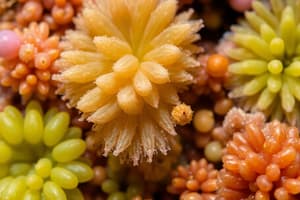Podcast
Questions and Answers
Brown algae are primarily autotrophic and do not rely on external food sources for energy.
Brown algae are primarily autotrophic and do not rely on external food sources for energy.
False (B)
Red algae exhibit a reticulate structural organization within their cell walls.
Red algae exhibit a reticulate structural organization within their cell walls.
True (A)
Green algae lack pigments that give them a green color.
Green algae lack pigments that give them a green color.
False (B)
Algae can only be found in freshwater environments.
Algae can only be found in freshwater environments.
Dinoflagellates belong to the subgroup of red algae.
Dinoflagellates belong to the subgroup of red algae.
All algae share close evolutionary relationships due to common ancestry.
All algae share close evolutionary relationships due to common ancestry.
Algae are the primary producers in aquatic ecosystems, providing the foundation for nearly all aquatic food webs.
Algae are the primary producers in aquatic ecosystems, providing the foundation for nearly all aquatic food webs.
Algae are not closely related to protozoa and fungi in an evolutionary sense.
Algae are not closely related to protozoa and fungi in an evolutionary sense.
Algae are not used in environmental applications such as carbon capture and reduction in greenhouse gas emissions.
Algae are not used in environmental applications such as carbon capture and reduction in greenhouse gas emissions.
The study of algae is not considered a distinct field of study, as it is not separate from the study of other organisms.
The study of algae is not considered a distinct field of study, as it is not separate from the study of other organisms.
Algae do not provide any valuable resources for human consumption or industry, such as crude oil, chemical feedstocks, and pharmaceutical products.
Algae do not provide any valuable resources for human consumption or industry, such as crude oil, chemical feedstocks, and pharmaceutical products.
Flashcards are hidden until you start studying
Study Notes
Algae: A Diverse Group of Aquatic Organisms
Overview
Algae refer to a diverse group of aquatic organisms encompassing various sizes, shapes, and habitats. They can be microscopic or macroscopic,single-celled or multi-celled, and thrive in freshwater, brackish, or marine environments. While they share attributes such as conducting photosynthesis and utilizing sunlight for energy, algae are not closely related from an evolutionary perspective.
Types of Algae
Algae come in various colors, reflecting the different types of chloroplast pigments present in their cells. The primary categories of pigmentation include red, brown, and green algae. These groups are distinguished by the presence of specific pigment types unique to each category.
- Red algae: Also known as rhodophytes, these algae typically exhibit primary symbiotic associations with other organisms and are characterized by reticulate structural organization within their cell walls.
- Green algae: Chlorophytes are another prominent type of algae, featuring green color due to the presence of chlorophylls and carotenoids.
- Brown algae: Facultatively heterotrophic, brown algae consist of phaeophytes and contribute significantly to the formation of solid rock substrata through their mineralized calcareous cell walls.
These three primary groups are further divided into subgroups such as diatoms and dinoflagellates, which play crucial roles in aquatic ecosystems.
Economic Importance
Algae possess economic significance due to their role in the production of oxygen and serving as the foundation of nearly all aquatic food webs. Moreover, they are a valuable resource for human consumption and industry. Algae provide crude oil, chemical feedstocks, and numerous pharmaceutical and industrial products. Algae are also used in environmental applications such as carbon capture and reduction in greenhouse gas emissions.
Evolutionary Relationships
The classification of algae is complex, as they are not closely related in an evolutionary sense. Some algae display features shared with protozoa and fungi, complicating their classification. Nevertheless, the study of algae falls under the field of phycology, examining their morphology, ecology, and evolutionary relationships.
Studying That Suits You
Use AI to generate personalized quizzes and flashcards to suit your learning preferences.




